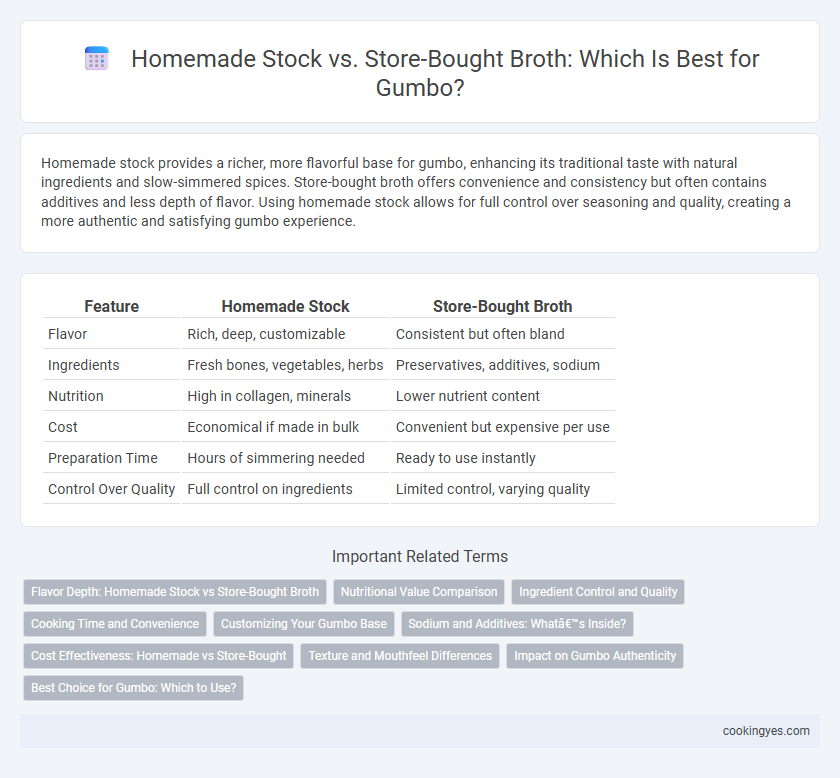Homemade stock provides a richer, more flavorful base for gumbo, enhancing its traditional taste with natural ingredients and slow-simmered spices. Store-bought broth offers convenience and consistency but often contains additives and less depth of flavor. Using homemade stock allows for full control over seasoning and quality, creating a more authentic and satisfying gumbo experience.
Table of Comparison
| Feature | Homemade Stock | Store-Bought Broth |
|---|---|---|
| Flavor | Rich, deep, customizable | Consistent but often bland |
| Ingredients | Fresh bones, vegetables, herbs | Preservatives, additives, sodium |
| Nutrition | High in collagen, minerals | Lower nutrient content |
| Cost | Economical if made in bulk | Convenient but expensive per use |
| Preparation Time | Hours of simmering needed | Ready to use instantly |
| Control Over Quality | Full control on ingredients | Limited control, varying quality |
Flavor Depth: Homemade Stock vs Store-Bought Broth
Homemade stock offers rich, complex flavors developed through slow simmering of bones, vegetables, and herbs, creating a deeply savory base essential for authentic gumbo. Store-bought broth often lacks this layered depth, providing a more one-dimensional taste due to added preservatives and flavor enhancers. Using homemade stock significantly elevates gumbo's flavor profile, delivering a more robust and satisfying culinary experience.
Nutritional Value Comparison
Homemade gumbo stock offers superior nutritional value compared to store-bought broth, containing higher levels of essential minerals, vitamins, and collagen due to slow simmering of fresh bones and vegetables. Store-bought broth often contains higher sodium and preservatives, which can diminish nutritional quality while making it less healthful. Opting for homemade stock enhances gumbo's depth of flavor and provides a richer source of nutrients critical for joint and skin health.
Ingredient Control and Quality
Homemade stock offers superior ingredient control and quality for gumbo, allowing precise selection of fresh vegetables, herbs, and proteins, which enhances depth of flavor and reduces additives. Store-bought broth often contains preservatives, sodium, and artificial flavors that can compromise the dish's authenticity and nutritional value. Crafting your own stock ensures a richer, more natural base, elevating the gumbo's overall taste and health benefits.
Cooking Time and Convenience
Homemade stock enhances gumbo with rich, deep flavors developed through hours of simmering, creating a complex and authentic base that store-bought broth often lacks. Store-bought broth offers unmatched convenience and significantly reduces cooking time, making it ideal for quick meals or busy schedules without sacrificing essential taste. Choosing between homemade stock and store-bought broth depends on balancing flavor depth and preparation time to suit cooking priorities.
Customizing Your Gumbo Base
Homemade stock offers unparalleled depth and richness, allowing you to control seasoning and ingredients to perfectly complement your gumbo's flavors. Store-bought broth provides convenience but often lacks the complexity and natural gelatin that homemade stock delivers. Customizing your gumbo base with homemade stock enhances authenticity and creates a more flavorful, silky texture essential for traditional gumbo recipes.
Sodium and Additives: What’s Inside?
Homemade stock offers full control over sodium levels, allowing you to create a rich gumbo base without the excess salt commonly found in store-bought broth. Store-bought broth often contains preservatives, artificial flavor enhancers, and additives like MSG, which can alter the gumbo's natural taste and increase sodium content significantly. Using homemade stock ensures a cleaner, more authentic flavor while minimizing chemical additives for a healthier gumbo foundation.
Cost Effectiveness: Homemade vs Store-Bought
Homemade stock offers superior flavor depth and allows precise control over ingredients but requires more time and effort compared to store-bought broth. Store-bought broth provides convenience and consistent availability with lower upfront time investment, often at a higher cost per volume due to packaging and branding. Evaluating cost effectiveness depends on frequency of use and desired quality, with homemade stock becoming more economical for frequent cooks and store-bought broth suitable for occasional or quick gumbo preparations.
Texture and Mouthfeel Differences
Homemade stock in gumbo offers a richer, more velvety texture due to the slow simmering of bones and vegetables, which releases gelatin that enhances mouthfeel and body. Store-bought broth often lacks this gelatin content, resulting in a thinner, less complex base with a lighter mouthfeel. The depth and consistency of homemade stock provide a fuller, more satisfying gumbo experience.
Impact on Gumbo Authenticity
Homemade stock enhances gumbo authenticity by providing a rich, deeply flavored base that reflects traditional cooking techniques and fresh ingredients. In contrast, store-bought broth often contains preservatives and lacks the complexity needed to develop the gumbo's signature depth. Using homemade stock preserves the dish's cultural integrity and elevates its overall taste profile.
Best Choice for Gumbo: Which to Use?
Homemade stock offers richer depth and complex flavor essential for authentic gumbo, made by simmering bones, vegetables, and spices for hours. Store-bought broth provides convenience but often lacks the robust taste and natural gelatin that homemade stock imparts, potentially resulting in a thinner, less flavorful gumbo base. Choosing homemade stock ensures a superior, deeply savory gumbo foundation, enhancing the dish's traditional authenticity and overall mouthfeel.
Homemade stock vs Store-bought broth for base Infographic

 cookingyes.com
cookingyes.com